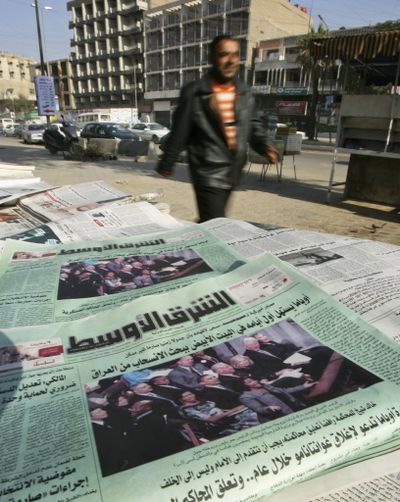Obama closing Guantanamo as he reshapes U.S. policy

WASHINGTON — President Barack Obama put his own clear stamp on U.S. national security policy on Thursday, ordering Guantanamo prison camp closed within a year, naming new envoys to the Middle East, Afghanistan and Pakistan and welcoming Secretary of State Hillary Rodham Clinton to help forge new global strategies.
“We intend to win this fight, we are going to win it on our terms,” Obama said of pursuing the campaign against global terrorism.
On his second full day in office, Obama took a series of steps overturning some of his predecessor’s most contentious war-on-terrorism policies.
By ordering shut the prison camp at Guantanamo Bay, Cuba, closing any remaining CIA secret prisons overseas and banning harsh interrogation practices, Obama said he hoped to signal that the U.S. would wage its struggle against terrorism and violence in a manner “consistent with our values and our ideals.”
He said his administration would not “continue with a false choice between our safety and our ideals,” an express slap at policies pursued by former President George W. Bush.
“It is precisely our ideals that give us the strength and the moral high ground to be able to effectively deal with the unthinking violence that we see emanating from terrorist organizations around the world,” Obama said.
The president also was ready to trumpet Clinton’s installation as secretary of state.
And he turned to veteran peace negotiator George Mitchell to guide the new administration through the Mideast thicket.
He was also expected to name Richard Holbrooke, former U.S. ambassador to the United Nations, to be special envoy for Pakistan and Afghanistan.
Obama’s central order would close the much-maligned U.S. prison camp within a year, and in so doing would be keeping a frequent campaign promise. The administration already has suspended trials for terrorist suspects at Guantanamo for 120 days pending a review of the military tribunals.
“This is me following through on not just a commitment I made during the campaign, but I think an understanding that dates back to our Founding Fathers, that we are willing to observe core standards of conduct, not just when it’s easy, but also when it’s hard,” Obama said.
In other actions, the president set up a task force that would have 30 days to recommend policies on handling terror suspects who are detained in the future and where Guantanamo detainees should be housed once it has closed.
Among other things, he signed an order requiring all U.S. personnel to follow the U.S. Army Field Manual while interrogating detainees and told the Justice Department to review the case of Qatar native Ali al-Marri, who is the only enemy combatant currently being held on U.S. soil.
Separately, Retired Adm. Admiral Blair, Obama’s pick to oversee the nation’s intelligence community, told a Senate confirmation hearing that the manual would not longer be called the Army Field Manual. He said it will be called “the manual for government interrogations.”
Blair told the Senate Intelligence Committee that the military field manual also will be reviewed for possible changes. The manual outlines 19 legal techniques and forbids nine.
Blair said one of his main responsibilities will be rebuilding the American people’s trust in the nation’s intelligence agencies. These agencies “must respect the privacy and civil liberties of the American people, and they must adhere to the rule of law,” Blair said. He will oversee the CIA, National Security Agency and other U.S. intelligence agencies as director of national intelligence.
U.S. foreign policy in the new administration will be overseen by four former senators — Obama and Clinton and Vice President Joe Biden, who served together until after this year’s election, and Mitchell, who served much earlier as Senate majority leader.
Obama was going to the State Department later Thursday to join Clinton in addressing diplomats there and — very likely — setting forth major elements of the administration’s emerging national security strategy.
The State Department visit also could be the setting for Obama to announces the appointment of Mitchell, the former Senate Democratic leader, as his special envoy to the region.
Mitchell, credited with arranging a peace accord in Northern Ireland, played the special envoy role for former President Bill Clinton and has handled other delicate diplomatic assignments since leaving the Senate in 1995.
Holbrooke, in addition to serving as U.N. ambassador in the Clinton administration, was also a key peace negotiator for the agreement that ended Bosnia’s 1992-95 war.
The White House has been preparing an announcement of the new mission for Mitchell, said diplomatic officials, speaking on condition of anonymity because they were not authorized to discuss the plans publicly.